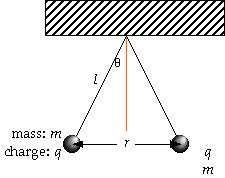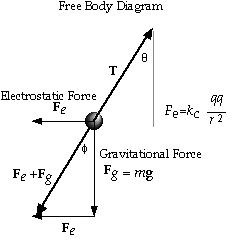The Problem of the Hanging Charges
A very common type of problem beginning Physics students are asked to solve is that of two charges hanging from from a common point by two strings. They are both charged with charge q and both have mass m. They dangle under the influence of both electrostatic forces and gravitational force.

If both strings are the same length then the electrostatic force of each charge on the other is equal in magnitude and directed horizontally. The gravitational pull of the earth on each charge is straight down. The sum of the gravitational and electric forces is at an angle determined by the vector sum of the two forces. If the two charged masses are at rest, the Tension of the string must balance that sum so that the entire net force is zero.
If Fe is the electric force, Fg the gravitational force and T the Tension then
Fe + Fg + T = 0
From the diagram one can see that the angle with respect to the vertical of the string and the angle from the vertical of the sum of electrical and gravitational forces must be the same.
θ = φ
Furthermore, the magnitudes of the sum of electric and gravitational forces must equal the magnitude of the tension.
|Fe + Fg| = |T|
From the vector addition of forces
Fe/Fg = tan(θ)
Fe = Fg tan(θ)
Coulomb’s law is
Fe = kc(qq / r2)
where kc = 9 x 109 N m2/C2
Therefore
kc (qq / r2) = mg tan(θ)
In this problem we are given that l and r are equal. Therefore, θ is 30°. If we wish to determine the charge given the angle of the hang.
$$k_c \frac{qq}{r^2}= mg \tan\theta$$ $$q^2= r^2 \frac{mg \tan\theta}{k_c}$$ $$q = r \sqrt{\frac{mg \tan\theta}{k_c}}$$
Let us assume in this case that m = 1 gram = 10–3 kg. Let l = r = 0.3 m.
$$\sin\theta= \frac{r/2}{l} = \frac{0.15 \mbox{m}}{ 0.3 \mbox{m}} = 0.5$$ $$\theta = 30^{\circ}$$ $$\tan\theta = \frac{\sqrt{3}}{2}$$
Thus
$$q=0.3 \mbox{m} \sqrt{ \frac{ (10^{-3}\mbox{kg})(9.8 \mbox{N/kg})(\sqrt{3}/2)}{9\times10^9 \mbox{Nm}^2/\mbox{C}^2}}$$ $$q= 0.3 \mbox{m} \sqrt{ \frac{ 9.8 \times 0.86}{9 \mbox{m}^2/\mbox{C}^2}10^{-3-9}}$$ $$q = 0.3 \sqrt{1 \times 10^{-12}\;}\mbox{C}= 0.3 \times 10^{-6} \mbox{C}$$
This problem asks for the charge given the length of the string and the distance between the charges. Other versions of the problem may ask for the length of the string given the charge and the angle or some other variation. You just have to rearrange the equation to put the unknown quantity on the left-hand side and the known quantities on the right-hand side.
Challenge your brain
If the two charges are not equal would the two angles of the two strings from the vertical be equal or not?
If the masses are not equal would the angles be equal or not?
